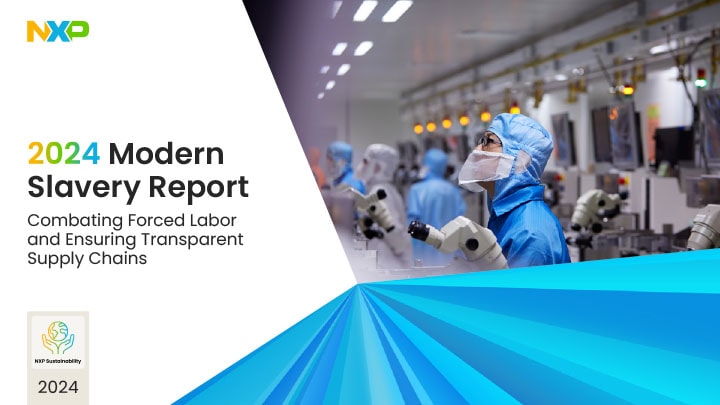Social Responsibility
Our Corporate Social Responsibility and Human Rights Program is designed to protect and respect human rights and reflects the highest possible standards of ethical business conduct.
Social-Responsibility Overview
NXP actively engages in efforts to protect and respect human life and the environment in which we live.
Labor and Human Rights
Our Corporate Social Responsibility and Human Rights Program is committed to the fundamental rights, freedoms and standards of treatment to which all people are entitled.
Supplier Engagement
NXP engages with our supply chain to drive resilient and responsible business partnerships.
2024 Modern Slavery Report
NXP is committed to combatting modern-day slavery and human trafficking within our business operations and supply chain.

Social-Responsibility Aspirations
The goals we set are meant to ensure continuous improvement in our Corporate Social Responsibility and Human Rights Program, not only in our own operations but also in those of our supply-chain partners.
| NXP Goals | Supplier Goals |
|---|---|
| No Priority or Major Nonconformances from Internal/Customer Audits | 100% of Key Suppliers Sign Supplier Code of Conduct Conformity Statement |
| Work Week of < 60 Hours and One Rest Day per Six Days Worked | Supply-Chain Due Diligence, Engagement and Collaboration |
Keeping the vulnerable safe
We go beyond standard evaluations supporting workers at all levels. Our risk assessment ensures our teams are not comprised of forced labor.
Social-Responsibility Governance
We work to integrate a governance structure into our Corporate Social Responsibility and Human Rights Program in order to encourage continuous improvement and accountability.
NXP Manufacturing-Site Audits
Every two to three years, each manufacturing site undergoes a third-party audit. The audit is either conducted by a third-party firm, using the NXP Auditable Standards on Social Responsibility, or by a designated audit firm that uses the Validated Assessment Program (VAP) of the RBA, which is based on the RBA Code of Conduct.
NXP Internal Third-Party Audits
We initiated more third-party audits in the early years of our Corporate Social Responsibility and Human Rights Program, but the number has remained relatively steady since 2017, with the exception of 2018, when we merged with Freescale Semiconductor and applied our standards to their manufacturing sites.
NXP Audits Requested by Customers
When we developed our Corporate Social Responsibility and Human Rights Program, we engaged in many customer audits. Now that our Program has matured and we have our own internal evidence and historical data from customer audits, we can demonstrate that we are a low-risk supplier and, as a result, customers request fewer annual audits of our sites.
Capacity Building
The purpose of our detailed capacity-building program is to make sure our manufacturing sites can recognize the signs of modern-day slavery for early intervention and a quick response. We educate our team members so they are aware of labor and human-rights issues. We particularly focus on team members whose job functions include purchasing, to understand compliance with applicable laws and standards.
| Groups | Training Received |
|---|---|
| Executive Management Team | Requirements of NXP policies, codes and standards with the expectation that they will support the Program by approving/providing the resources necessary for its success |
| Manufacturing Management Team | Requirements for facilitating and implementing the standards at a manufacturing site and how they can provide the necessary resources to sustain continuous improvement |
| Manufacturing Site Social Responsibility Team | In-depth specifics for implementing the Program and standards at their manufacturing site and how, as individuals, they can support the effort in their respective functional area |
| Manufacturing Subject Matter Experts | RBA lead-auditor training, or similar, and certification, emphasizing labor and ethics, so they can guide the site's Social Responsibility Team |
The Fight Against Modern Slavery
Impacting the lives of foreign migrant workers through our policies, standards and recruiting practices.
Contact Us
We are here to answer any inquiry regarding our corporate sustainability efforts, including EHS and environmental product compliance.